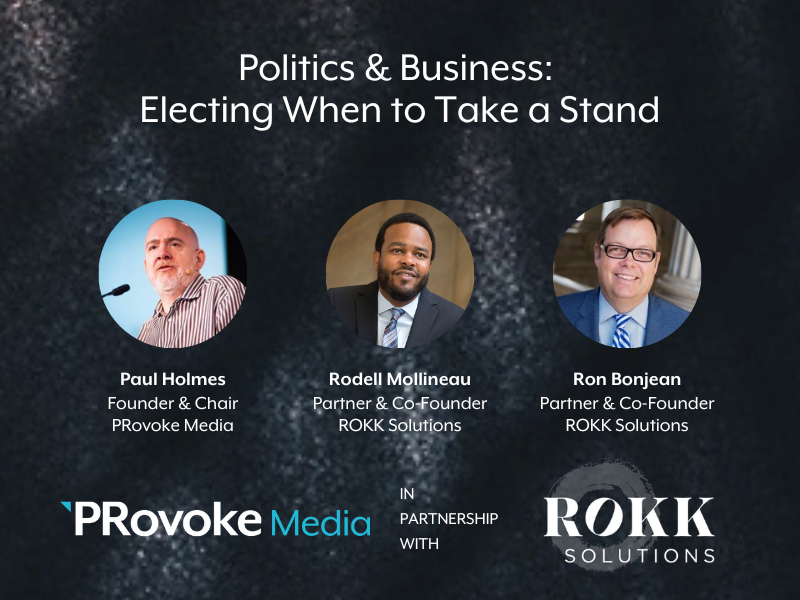PRovoke Media 29 Sep 2022 // 4:37AM GMT

The 2022 U.S. midterm elections are only a few months away, and there are a number of hot items up for debate and on citizens’ minds— gun violence, the climate crisis and the ongoing presence of COVID-19, to name a few. In parallel, employees are seeking new employment more than the past few years — coined the Great Resignation — and consumers are being more mindful of where they put their dollars. Both employees and consumers are paying more attention to corporations’ policies and practices when deciding where to work and what to buy. All of this raises corporate governance questions for organizations, and they’re not sure what to do next: What does this change mean for organizational leaders in terms of addressing social issues, especially political ones? What are the best practices for companies considering taking a stand?
In this PRovoke Media Podcast, Rodell Mollineau and Ron Bonjean, co-founders and partners at ROKK Solutions, discuss the current political situation in the U.S., and its implications for business and PR. After all, in many cases, it’s no longer possible to avoid getting involved in public political debate. The pressure from customers and employees is too strong. But on the other hand, not every conversation is one a corporation needs to be part of.
“This is no longer just about inflation and crime, which I think Republicans would love for this election to be about,” Mollineau said. “It’s still about inflation, and it’s still about crime, but it’s also about reproductive rights. It’s about rule of law. There are many issues that will be on voters’ minds as they go to the to the ballot box in November.”
In June, a new CNBC|Momentive survey found that more than half of American workers say they support business leaders speaking out on politics. Women are more likely than men, younger workers are more likely than older workers, and — most dramatically — Blacks, Asians, and Hispanics are more likely than whites to say they approve of business leaders who speak up.
According to Bonjean, it’s important to come up with a plan now because stakeholders are going to demand it come November.
“There’s more of an expectation by the constituencies of a corporation, whether it’s the employees, suppliers, customers, that they play more of an active role in what’s going on with society,” he said.
Mollineau agrees and says it’s just the matter of getting a company’s ducks in a row.
“Companies have the tools,” he said. “It’s just a matter of organizing them in the right way. And that’s why they need a process and a framework. These [political involvement] decisions can’t just be made at the C-suite level, which is oftentimes where they are made. There needs to be a discussion about how these decisions affect the different business lines, how they affect internal and external stakeholders, how they affect your government affairs function.
Topics include:
0:00: Introductions
3:40: Who’s Winning the House Seats?
7:43: What Divided Government Means for Business
12:23: Political Topics to Focus on
18:45: Wokeism: What it is, Why it Matters
23:03: The Aftermath of January 6
27:13: STAR: Social Threat Assessment and Response Service
32:55: When to Speak Up, When to Sit Down
37:28: How to Prep for the Change Ahead



































.jpg)

















